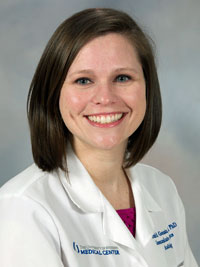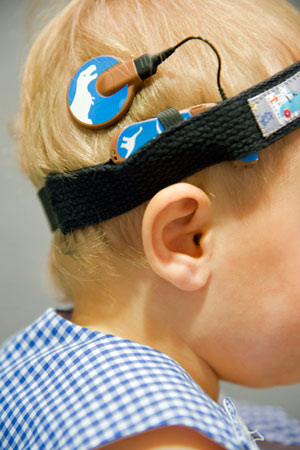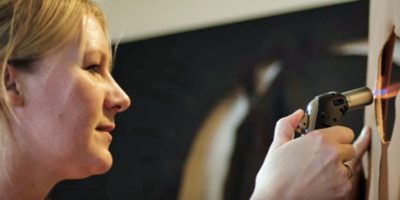Dr. Vicki Gonzalez is an Assistant Professor and Chief of Audiology at the University of Mississippi Medical Center. Her clinical and research interests are in the area of cochlear implants. Prior to her current role, Vicki studied Audiology and Hearing Sciences at the University of South Florida.

“…I have experienced a multitude of reactions from patients on the day of their activation. The most common would be tears of joy, not only from the recipients themselves, but also from their families…”
Vicki, please can you tell us about your career to date and what made you want to pursue a career in medicine?
At a very young age, I found myself in doctors’ offices quite often. My experiences left an impression on me. I wanted to assist other patients in the same positive way that many of my doctors assisted me.
It wasn’t until my undergraduate studies that I found audiology, and it was during my graduate school education that I found a passion for patients with cochlear implants [electronic medical devices that replace the function of the damaged inner ear]. I began working with cochlear implant candidates and recipients during the second year of my doctor of audiology programme in our university clinic.
From that point forward, I sought out internship and externship opportunities that included a cochlear implant population. I have had and met incredible mentors and colleagues along the way and have worked closely with many ENTs [medical specialists concerned with the diagnosis and treatment of disorders of the head and neck, including particularly the ears, nose, and throat] and neurotologists.
What does your role involve on a day to day basis?
I am not only a clinical audiologist but also the chief of our Audiology Division. There are days when I’m immersed in patient care and others where I’m responsible for administrative duties. I thrive on the duality of my position.
My clinic days involve a full schedule of six to eight patients per clinic day. I spend 45 minutes to two hours with each patient depending on their needs. The administrative side of my role involves ensuring that our division is meeting our short-term goals and building a foundation for long-term success.
I also look for avenues to grow and expand our division in order to meet the audiology demands of the state of Mississippi. It involves meeting with Medical Center administrators and medical professionals in other disciplines to promote positive hearing health care, as it is important for all health care.
Please could you tell us more about the work you do around cochlear implants?

My clinical work focuses on candidates and recipients with cochlear implants. I see them through the process of determining candidacy, to activation, and then throughout their lifelong journey with a cochlear implant.
To determine candidacy, I evaluate their hearing status, screen their emotional state, and determine their social support. The activation is where the patient hears with a cochlear implant for the first time. Their follow-up visits involve programming changes, device troubleshooting, and periodic evaluation of speech understanding.
What sort of reactions do patients have when their implants are switched on for the first time?
I have experienced a multitude of reactions from patients on the day of their activation. The most common would be tears of joy, not only from the recipients themselves, but also from their families. (I always keep a box of tissues handy!)
I see all of our adult cochlear implant patients, and many of them had previously not heard for several years or decades. Although the sound they hear on day one may not be great and speech is still difficult to understand, it provides more auditory information than they previously had and for that they are grateful.
There are also those that react unfavourably. Even though we discuss realistic expectations at length beforehand, they still hope for complete restoration of hearing and speech understanding on day one. Each patient presents different unique challenges, which makes each initial activation exciting.
What impact do they have on the lives of your patients?
We have five senses, and I have the incredible opportunity of helping to restore one of those five senses once it’s no longer usable for successful communication. The ability to hear and communicate with others has a tremendous impact of a person’s quality of life. Hearing loss can be very isolating, having personal, social, and professional negative implications.
For many of my patients, cochlear implantation leads to improved quality of life and an enhanced sense of safety. It’s incredibly rewarding when a mother hears her child’s voice again or an infant hears his parents’ voices for the first time. It’s rewarding when a child succeeds in the classroom due to understanding the teacher’s lessons and instructions. It’s rewarding when a teenager is able to listen to music or talk on their cell phone. And, it’s rewarding for an adult who is now able to reintroduce themselves into the workforce with confidence.
What new innovations are you excited about in your work and how is technology evolving?
I’m excited about the possibility of pharmacological treatments now being researched for use in combination with cochlear implantation that can potentially lead to improved communication and better patient outcomes. Cochlear implant technology is continuously evolving.
The quality of sound patients receive has greatly improved with enhancements in signal processing strategies. The external design has also become more cosmetically appealing. Patients can also now make use of wireless / Bluetooth technologies providing them with an added sense of normalcy in an ever-increasing technological world.
What is your advice for girls and women who want to make their career in audiology?
A part of being a women and a feminist is having a choice, and I encourage all females to pursue their career ambitions. Medicine and audiology offer tremendous opportunities for career-oriented women. Having an impact on another individual’s quality of life is very rewarding. Medicine and audiology are fields that continue to grow, and the need for qualified women in health care will always be present. Audiology is somewhat different from medicine in that it’s a female-dominated profession.
What is coming up next for you and the University of Mississippi Medical Center?
The continued growth of our cochlear implant program. When I started working at UMMC, we had a good-sized paediatric cochlear implant programme, but a relatively small adult population. Since I’ve started, education targeted to potential candidates, outside providers and internal referral sources has improved. This has exponentially expanded the number of new recipients each year. We hope this growth continues.
https://www.facebook.com/ummc1





